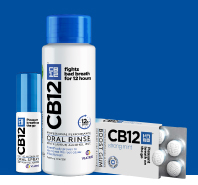
Bad Breath
If you think bad breath comes from the stomach, think again. In reality, the most common cause of bad breath is a build-up of bacteria in the mouth – in fact bad breath originates in the oral cavity almost nine times out of ten1,2. These bacteria are found in between the teeth, in the gum pockets and in the pits on the back of the tongue, and when they break down food particles in your mouth, they also release so called volatile sulfur compounds (VSCs). Smelly breath is not dangerous, but a foul-smelling mouth can be embarrassing and cause awkward situations in your professional and personal life. You may start to feel insecure and lose confidence any time you open your mouth around other people, for example in business meetings or on a date. Or, even worse, you may not realize that you have bad breath, and your friends and family are not comfortable telling you.

-
Causes of bad breath
There are many causes of bad breath and apart from sulfur compounds formed in the mouth, other causes of bad breath are gingivitis (inflammation of the gums), periodontitis, dry mouth, low-carb diets and fasting. In addition, virtually everybody has bad breath in the morning because saliva flow decreases during the night. Bad breath can also be triggered by spicy food, garlic, smoking and alcohol.
-
Bad breath from the mouth
Some of the most common causes of smelly breath originating in the mouth are:
- Poor oral hygiene. Food that gets stuck between your teeth becomes riddled with bacteria and eventually starts to rot unless it is removed. To prevent build-up of bacteria you need to floss on a regular basis in addition to brushing your teeth twice a day. For a more lasting effect, you can also try to rinse with a mouthwash.
- Gingivitis and periodontitis. Gum inflammation and gum disease are usually caused by a build-up of plaque in the mouth, which in turn can result in bad breath.
- Dry mouth. Saliva helps cleanse the mouth and protects it against foul-smelling bacteria, which is why dry mouth can contribute to bad breath. Dry mouth has many causes, including dehydration, stress, certain diseases and medications.
- Tooth extraction. Pulling a tooth can cause bad breath for a few days while the blood is clotting and the wound is healing. During this time good oral hygiene is even more important than usual. Tooth decay and other infections in the mouth can have the same effect.
- Stress and hormonal changes. Pregnancy, puberty and menopause can also trigger bad breath.
-
Bad breath caused by other factors
Some of the most common lifestyle factors that cause smelly breath are:
- Food and drinks. The odors from garlic, onions and other spicy foods go straight to your blood stream and lungs. When the odors are exhaled, they come across as bad breath. Coffee is another big offender when it comes to bad breath.
- Smoking. If you smoke, you probably have bad breath and the only way to improve it is to quit smoking.
- Alcohol. People who drink too much alcohol usually develop a problem with bad breath. This has to do with the way the body metabolizes the alcohol.
-
Prevention of bad breath
Prevention of bad breath is in most cases easy, and starts with good oral hygiene. But simply brushing your teeth may not be enough. You should also use floss or an interdental brush to clean in between the teeth, and if you have bad breath you could use a mouthwash like CB12 as a complement. CB12 prevents bad breath by neutralizing the odorous sulfur compounds in your mouth, instead of just masking the smell. It contains both zinc acetate and chlorhexidine diacetate, which has been clinically proven to prevent bad breath for 12 hours after each use1.
- 1. Thrane PS, Young A, Jonski G, et al. A new mouth-rinse combining zinc and chlorhexidine in low concentrations provides superior efficacy against halitosis compared to existing formulations: a double blind clinical study. J Clin Dent 2007; 18(3):82-87.
- 2. https://www.ncbi.nlm.nih.gov/pmc/articles/PMC3633265/





